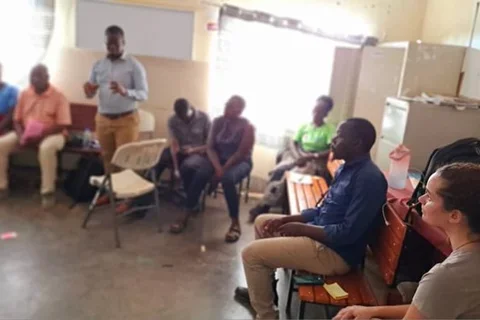Mentor Spotlight on Working with a Discovery Experience Student

DGSOM students in the Global Health Equity Pathway are focusing on global health equity during the inaugural Discovery experience as part of DGSOM’s HEALS curriculum. Two-thirds of the seventeen students in the Global Health Equity Pathway work on projects abroad. Our students are engaging in a variety of research, public health, and advocacy projects, which will result in a range of outputs including investigative manuscripts, think pieces, and other outputs that have been shaped by their partner sites. We intend for these collaborations with partners around the world to have positive impacts that extend beyond this year.
GHP connected with one student and one mentor about their experiences during this inaugural Discovery Experience!
Misheck Mphande, a mentor with Partners in Hope (PIH) in Malawi, shares his experience mentoring DGSOM Global Health Equity Pathway student, Kate Holland. Learn more about Partners in Hope and other Global Health Program partners.
How do medical students fit within PIH and what do you see as their contributions? Are there any unique challenges in working with these students?
Misheck: The set-up at PIH (where we have a medical center and programs) is designed to provide medical and practical programming experience for students. Because of the duality, students settle in well, building on already existing infrastructure and opportunities. They can gain new insights by attending clinical consultations and shadowing experienced doctors, while at the same time contributing to programming, which directly feeds into care provision in real time. Students can see their ideas improve lives within resource-constrained settings. Challenges may exist in adapting to their trainee status, where they are here both to get exposure to the clinical side of PIH as well as the programmatic. However, we rely on detailed scheduling to avoid scheduling conflicts to provide a healthy working environment.
Can you talk about the project that Kate Holland, our DGSOM Discovery student, is working on with the team? What is the potential impact of the project?
Misheck: We are working on a project called Integrate. The study builds on work already done in two prior studies (i.e., IDEaL and Engage) which sought to improve men’s engagement in HIV care. In these studies, we developed a men-specific counselling curriculum that was used as an arm in the IDEaL study. Results were positive and 88% of the men reached were retained in care at 6 months. In Integrate, we seek to co-create (with clients, health care workers and implementing partners) an easy to implement-cheap add-on intervention package (curricula for 2, 12, and 30 minutes; Monitoring and Evaluation strategies; and costing components) that builds on the larger curriculum used in the prior two studies. We aim to pilot the package in real life settings and measure impact. Kate is a study coordinator on the project. The potential of the project is to scale up provision of client-centered care that will address men’s unique barriers and improve quality of care while reducing the work burden for health care workers.
What advice would you give future students who are interested in working with an organization like Partners in Hope?
Misheck: We recommend that they be open and innovative. As an implementation science department, we rely on novel ideas to try out, and students always come with fresh ideas. Working with organizations like PIH requires thinking outside the box and advocating for one’s ideas. It may be a challenge for a student who is only in Malawi for six months, but it is rewarding as the work directly informs and impacts the populations we serve.
Could you tell us about a project that you and your team plan to take on next, perhaps one where future students might get involved?
Misheck: The RESPOND study aims to identify high risk archetypes to co-create interventions that respond to specific needs of each archetype.
Thank you for mentoring Kate this past year, and for sharing the important work you are doing at PIH!
Photo caption: Kate Holland (front right) and her mentor Mishek meet with community members.